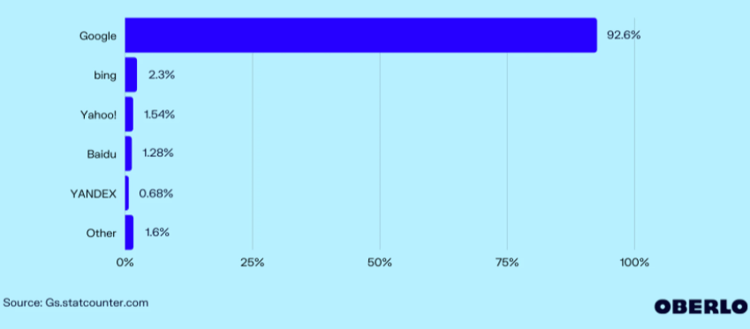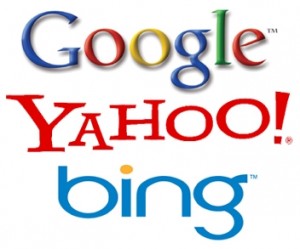Inbound Marketing Blog
for Manufacturers and Healthcare Companies
Google SEO vs. Bing, Etc. | Is It Worth Ranking in Other Search Engines?

How often do you default to saying “Google” when you’re talking about search engines in general? (For example: “When’s that new horror flick coming out? Let me Google it.”)
There’s a reason we do this: Google rules the world. Well, most of it at least, as you’ll see below.
More than 9 out of 10 user searches happen on Google. This number includes Google-owned YouTube, Google Images, and Google Maps. This mega-company influences how we choose keywords, set up our website, and name our pages.
But would your business get additional value out of targeting Bing or another engine?
Each engine has its own niche that could make it a worthwhile alternative to Google -- for certain audiences. Read up to see if your company’s marketing strategy could shine on any of these platforms:
Google SEO vs. Bing & Friends: Ranking Factors
Don’t try to get too cute -- Google is the most obvious place to focus your marketing efforts in North America (and most everywhere else). However, the sheer number of Google users means that to rank above your competitors, you’ll have to put effort into search engine optimization best practices.
 (Graphic courtesy Oberlo)
(Graphic courtesy Oberlo)
Not everyone loves Google. Some web users don’t want to do business with huge corporations, or simply don’t trust their motives. Depending on your niche product and audience, alternative search engines you may want to rank in include:
- Bing
- Yahoo!
- Baidu
- DuckDuckGo
- Ecosia
- Yandex
There are others, of course, but these are the engines most likely to impact your marketing strategy:
1. Bing
Hollywood Nickname: “The Biggest (Best?) Loser”
Renamed Microsoft Bing in October 2020, this is the distant runner-up in web searches today. Even as the #30 most-visited site on the internet -- and status as the default search engine on Windows 10 and 11 -- Bing still doesn’t get much love.
According to Statcounter, Bing holds a 6.11% share of the U.S. market. That number drops to 4.14% for the U.K., 4.36% for Canada, and even lower for the Asian and African search markets.
Bing isn’t all bad news. Some studies show Bing may offer certain advantages over Google, including:
- Lower bounce rates
- More page visits per session
- Higher average time on site
- Higher subscription signup rates
Optimizing your website for Bing is similar to optimizing for Google. Bing has its own ranking algorithm (called BERT), but it has a lot in common with Google’s. It helps the search engine understand what words mean, both within a given sentence and within broader context.
Translation: Make your website copywriting useful and clear (just like you would for Google).
Key difference: Bing factors “social signals” into its rankings. Here’s a quote straight from Bing on the matter:
If you are a social influencer, your followers tend to share your information widely, which in turn results in Bing seeing these positive signals. These positive signals can have an impact on how your site ranks organically in the long run.”
Your last name doesn’t have to be “Kardashian” to be an influencer on social media. Simply sharing great B2B content on, say, LinkedIn, can help increase relevant traffic to your website (for free, no less), which shows Bing you’re trustworthy. If B2B social media strategy is a big part of your company, consider trying to rank in Bing.
To earn your way into Bing SERPs (search engine results), familiarize yourself with Bing’s webmaster guidelines.
2. Yahoo!
Hollywood Nickname: “Grumpy Old Men (and Women)”
Yahoo has been the default search engine for Firefox browsers in the United States since 2014. This feat meant something back then, but matters little now. That said, Yahoo’s web portal is the world’s #11 most-visited website.
Many younger folks joke about the age of a typical Yahoo! user, as the perception is that the platform more or less died a decade ago. There’s certainly some truth to this, as many users are legacy Yahoo! Mail users who take the “when in Rome ...” approach to searches. (They’re already on Yahoo!, so they use the search tool out of convenience.)
If your target audience is older, marketing toward Yahoo! users may be worth investigating.
Yahoo’s interesting in that it uses Bing’s horsepower alongside its own web crawler, “Slurp,” to determine search results. Because Yahoo! Search is powered partly by Bing results, you don’t have much extra work to do if you’re already optimizing your site for Google and Bing.
(p80 Tip: When you submit your pages to Bing for indexing, they automatically go to Yahoo as well.)
3. Baidu
Hollywood Nickname: “Crouching Tiger, Hidden Engine”
Founded in 2002, Baidu is the most popular search engine in China. Unlike Yahoo!, its market share is rising, and Wikipedia says Baidu serves “billions” of search queries each month.
Baidu owns a 1.29% market share worldwide, but that includes a 67% overall share in China and 80% of Chinese mobile searches.
Baidu is accessible worldwide, but only in one language. (We’ll let you guess which one.) Nonetheless, if you want to target Chinese buyers, it’s a no-brainer to optimize for Baidu.
Key difference: The majority of Google SEO best practices work well here, but there are a handful of changes in how Baidu evaluates sites. Baidu has several unique areas of emphasis, such as:
- Content is written in simplified Chinese
- Clear meta descriptions
- Your website being Chinese-registered
 4. DuckDuckGo
4. DuckDuckGo
Hollywood Nickname: “Saving Ryan’s Privacy”
While DuckDuckGo’s market share is only 0.6% globally, use is growing. The answer why is simple -- privacy.
DuckDuckGo doesn’t track users and doesn't allow targeted ads.
The company still makes money from advertising -- but only shows ads based on the keywords a user searches for, which aren't connected to browser or purchase history. Keep this in mind if you consider paid advertising on DuckDuckGo.
This dark-horse candidate pulls information from more than 400 sources to show results, including Bing, Yahoo!, and even Wikipedia. DuckDuckGo doesn’t have a search index of its own, instead relying on these other sources to answer users’ questions. This is a major limitation compared with Google, whose algorithm considers all websites on the internet.
This may affect DDG’s ability to grow beyond the “privacy first’ niche it occupies.
As for ranking organically (without using ads) in DuckDuckGo … best practices for Google Search should work here too. SEO for DuckDuckGo requires high-quality backlinks and a good understanding of the searcher’s goal with a given keyword. That goal could be:
- Informational — looking educate themselves
- Commercial — looking to investigate brands or services
- Transactional — intending to complete a purchase or otherwise “convert”
- Navigational — seeking a specific site or page
Key difference: DDG uses Apple Maps for its local search results. If your business serves a small radius, make sure to claim your Apple Maps listing.
5. Ecosia
Hollywood Nickname: “Captain Planet”
Ecosia is a social business with roots in Berlin since 2009. Beyond providing a Google alternative, the founder’s secondary goal with Ecosia’s search engine is to finance planting and restoration projects.
Ecosia’s search results are powered by Bing, and they in turn power the environment. Ecosia uses the money earned from display ads to support the planning of trees. Ecosia gets a small share of each of your ad clicks; it takes about 45 searches to finance the planting of one tree.
If your company’s target industries are environment-minded, Ecosia may be worth a look.
On a side note that may also affect its clientele, Ecosia also claims to not share searchers’ data.
6. Yandex
Hollywood Nickname: “From Russia, With Links”
Yandex is a technology company that builds machine learning-powered products and services. Yandex is Russia’s most-visible search engine, making up 65% of all searches in that country.
Naturally, you’re best using the world’s #5 most-popular engine is you want traffic and leads from this part of the globe. Along with Russia, is popular in:
- Turkey
- Ukraine
- Belarus
- Kazakhstan
Note that Yandex SEO growth will take longer than in Google, as Yandex is slower at finding and ranking new content. To get your content indexed more quickly, use Yandex.Webmaster to submit new or overhauled pages proactively, similar to how you would in Google Search Console.
Key difference: Actually, we have several. Yandex emphasizes keywords in URLs to a level that Google doesn’t. Oddly enough, Yandex is less focused on internal linking structure and backlinks.
Other differences include extra emphasis on:
- Location: Searchers in different areas will receive varying results for the same term. It’s easier to get your site ranking in a certain region, but harder to do so nationally.
- Average time on page: To perform well in Yandex rankings, create engaging content that mirrors the user’s expectations for that search term.
- Fresh content: Up-to-date content that fully answers the current reader’s questions is essential to success.
- Domain age: Often the website domain itself needs to be older (with several valuable pieces of recent content) for it to rank highly.
- Keyword stuffing: This shady SEO tactic involves cramming the same keyword onto your page repeatedly in hopes of ranking for that term. Stuffing is taken much more seriously by Yandex, especially if the keyword is irrelevant to your page.
Google SEO vs. Bing & Friends: Worth the Effort?
Google should always be a B2B marketer’s #1 priority for search engine optimization. As a bonus, optimizing your website for Google already gets you at least halfway there when it comes to the other engines.
Whether it’s Google, Bing, or something we haven’t even mentioned (like Ask.com or AOL), customer education is key to SEO marketing. As long as you write helpful content that matches the needs of your ideal buyers, you’ll rank right where you need to.
To write copy that gets your company found in any search engine, use our Website Copywriting Guide. (Don't worry, the tips apply to your industry, too:)
Our Blogs, Direct to Your Inbox!
How to Audit your Online Marketing
If you are executing digital marketing, congratulations! You are most likely already one step ahead of your competition, and making strides to meaningfully connect with prospects online. But, how do you know if you’re seeing continual success year over year, and improving your metrics?
Without the tools in place to analyze and benchmark your efforts, it is impossible to scale your online marketing and ensure continuous success.



